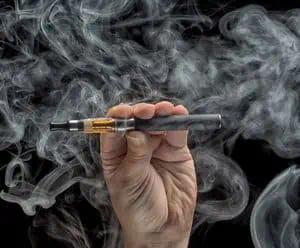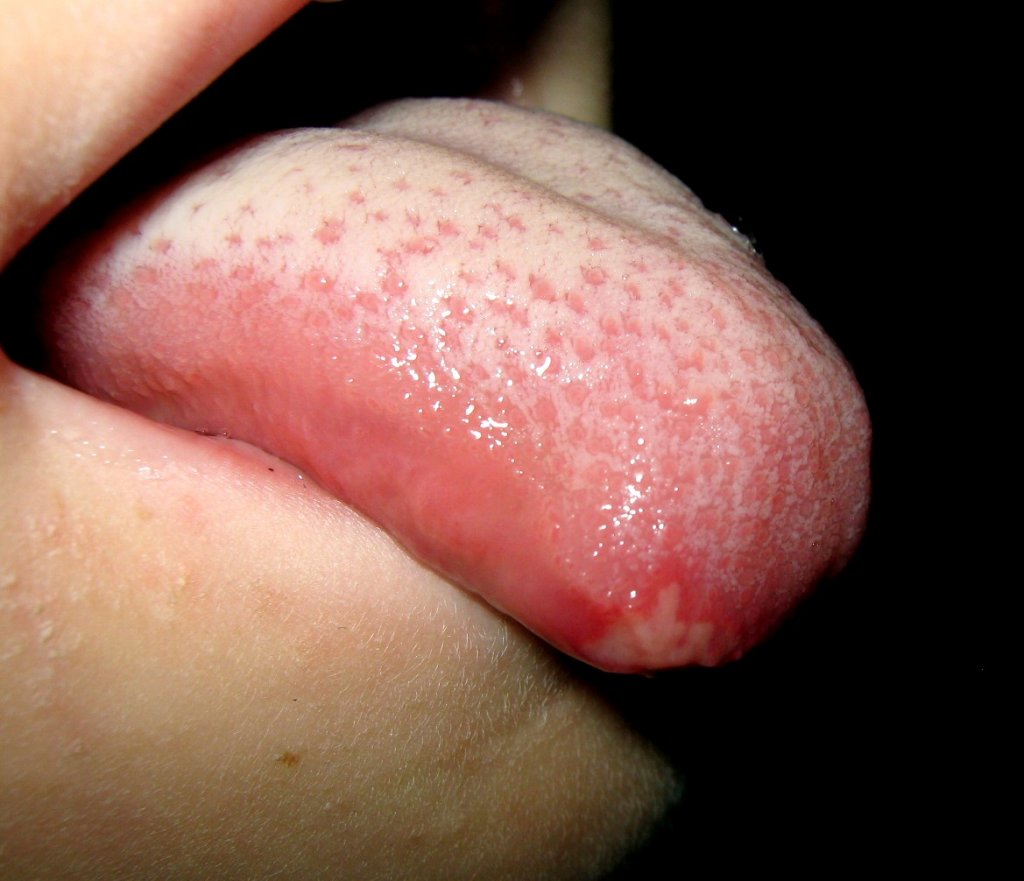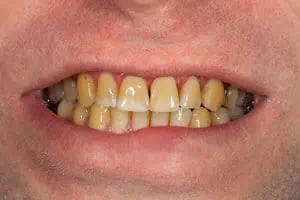Is vaping bad for your teeth? Most of us are by now well aware of the negative health effects of smoking on general and oral health, but how much do you know about vaping, or e-cigarettes?
Around 9% of adults in the US use e-cigarettes, many of whom are ex-smokers. While most experts in the medical field admit that vaping is probably less harmful than smoking, they still caution against it, and the question remains: does vaping damage your teeth?
If you’ve ever wondered how vaping affects oral hygiene and overall health, this article is for you. We're going to answer some common questions including:
- Does vaping cause bad breath?
- How long after tooth extraction can I vape?
- Can vaping cause canker sores?
- Does vaping hurt your teeth?
- How can you whiten teeth stained from vaping?
We'll take a close look at these issues and present some ways to take care of your gums and teeth while using e-cigarettes.
If you’re looking for a way to whiten your teeth stained by vaping without the expense of professional whitening procedures, check out Snow. Their professional home whitening system delivers lasting results in as little as 9 minutes a day.
In This Article
What is vaping?
Vaping is inhaling vapor from electronic cigarettes. These portable devices use battery-generated heat to convert e-liquids into vapors containing a variable amount of nicotine.
Vaping technology was patented way back in 1960 but it failed to take off at the time. Nowadays, popularity for vaping has spiked because of better marketing strategies and social media trends.


Modern vaping devices usually look like pens and are often marketed with tempting flavors making them particularly appealing to younger generations.
It may sound like a good alternative to cigarettes, but many people, especially younger people, are not aware of the health hazards of such devices. According to this report from the U.S department of health and human services, the use of vaping products saw a staggering 900% rise among high school students between the years 2011 and 2015.
Is vaping bad for your teeth?
Most doctors begrudgingly admit that vaping isn't as bad as smoking cigarettes. However, they still warn about the dangers of vaping, and their concern is supported by emerging research. Studies are showing that flavored e-cigarettes and vaping devices contain harmful ingredients that can have adverse effects on your oral health. Here are some of the main ingredients in e-cigarettes that can harm your teeth and mouth:
Propylene glycol (PG)
Propylene glycol (PG) is colorless, odorless, synthetic carrier product with a slightly sweet taste. The tissue in our mouths can absorb PG very efficiently, which can cause irreversible damage to teeth enamel and gums. Additionally, because of its hygroscopic chemical composition, PG tends to absorb moisture and is the reason so many vapers often experience dry mouth.
Vegetable glycerin (VG)
One of the most common ingredients of e-cigarettes, vegetable glycerin (VG), is a clear liquid typically synthesized from soybean or coconut. VG is sweet, and although it doesn't directly contribute to tooth decay and dental caries, it becomes harmful when combined with flavoring agents in e-liquid.
In fact, flavored vapes can double the formation of biofilm (dental plaque) and reduce enamel hardness by 27%, compared to those with no added flavor.
Nicotine
Nicotine is a highly addictive chemical and is a well-known cause of smokers' teeth. While the potency of nicotine can be much lower in vapes, it still causes tooth discoloration among its users. Nicotine becomes brown instantly when it comes into contact with oxygen. The porous nature of human teeth enamel means that staining pigments are easily absorbed, so vaping will stain your teeth over time. Unless, of course, you choose to vape without nicotine.


Nicotine also reduces the blood flow in the mouth, which can mask the signs of gum disease and make it harder for your body to fight infection. It also reduces the flow of saliva, leading to dry mouth and numerous other complications.
For a summary of why vaping is bad for, you can watch the video below:
Does vaping cause bad breath?
While the severity of bad breath caused by vaping is less than that of cigarettes, vaping can cause bad breath. That's mainly because of the chemicals found in e-liquids.
These chemicals include propylene glycol and nicotine, which cause dry mouth symptoms leading to a build-up of bad bacteria in the mouth, the primary cause of bad breath.
That being said, the effects on oral hygiene and bad breath from vaping will likely be much less severe.
How long after tooth extraction can I vape?
You should wait for 72 hours after a tooth extraction before you vape. The same goes for traditional tobacco use as well. There are various complications that vaping can lead to.
According to the American Association of Nurse Anesthetists (AANA), vaping poses risks to oral health and may lead to many complications if used after surgery. For one, nicotine can make it harder to heal after surgery and may cause complications like infection. And then there's the dreaded dry socket—the sucking motion involved in vaping and smoking can remove the blood clots that form at the site of extraction, exposing the bone underneath and causing extreme pain. The longer you can resist using e-cigarettes after surgery, the better from a recovery point of view. Read more about how to prevent dry socket.
Always be transparent with your dentist about your tobacco and vaping use when going for a consultation for tooth extraction.
Can vaping cause canker sores?


Mouth ulcers, or canker sores, can be caused by stress and acidic foods. And it turns out that vaping is another major cause of mouth ulcers as well due to the high temperature produced by vapes. This comparative study between former smokers and e-cigarette users found that vape users are more susceptible to ulcers and inflammation.
Not only can vaping cause canker sores, but vaping chemicals it also can make it more difficult to recover.
How to minimize the effects of vaping on your oral hygiene
The best way to minimize the effects of vaping on oral hygiene is to stop vaping altogether. However, if quitting vaping is out of the question, then you need to be diligent with your oral hygiene. The following steps are essential to caring for your oral health, for vapers and non-vapers alike:
- Regularly drink water after you vape to avoid a dry mouth. Staying hydrated will help with bad breath.
- Always brush at least twice per day and floss at least once per day.
- Keep regular visits to your dentist to enable early diagnosis of any oral health issues that you might be suffering from.
How to whiten teeth stained by vaping
Fortunately, there is plenty you can do to get rid of vaping stains on your teeth. We'll briefly go over some of them now.
Professional teeth whitening
Professional teeth whitening is done at the dentist's office. This is a good option if you're also concerned about oral hygiene, because before the professional procedure, your dentist will clean your teeth and gums.
Normally a professional procedure will include bleaching agents and UV light or argon lasers. You can read more about professional teeth whitening in our full account here.
Home whitening products and kits
If you want to see results but you're not too keen on the hefty price tag of professional whitening, home whitening kits may be your best option. These kits can include whitening strips, gels, or LED whitening kits.
Snow is one type of LED kit that we recommend for professional results at a lower price. If it sounds like something you might be interested in, you can find out more about Snow and why it's so successful in our Snow teeth whitening review.
Home remedies
Home remedies can include the following:
- Baking soda paste
- Hydrogen peroxide rinses
- Strawberries
- Activated charcoal
- Oil pulling
Have a look at the following table for a summary of your home remedies and options.
Treatment type | Treatment | Average cost |
Home remedies | Baking soda and hydrogen peroxide | $7 |
Lemon juice/turmeric powder/strawberries | Check your pantry | |
Professional teeth whitening | In-clinic procedures | $300–$1,000 |
Over-the-counter | Teeth whitening strips, gels and kits | $15–$400 |
Teeth whitening toothpastes | $20–$25 |
Conclusion
Dental experts regularly warn people about oral health issues related to vaping. This detailed study highlights health issues that vaping might pose even to people smoking for the first time. These include:
- Tooth decay and tooth loss
- Bad breath
- Gum disease or periodontal disease
- Receding gums and damage to the gum tissue
- Inflammation and mouth ulcers
People who regularly vape should be aware that even though vaping doesn't use tobacco, it can still be harmful. Although studies related to vaping are still in the early stages, its effects on oral hygiene are evident. According to the Johns Hopkins School of Medicine, emerging studies suggest that vaping can be linked to chronic lung disease and asthma. There is also the risk of lung injuries and even death when people modify their devices or use liquids from the black market.
FAQs
Does vaping stain teeth?


Vaping can stain teeth, although not as much as traditional smoking. Yellow teeth from vaping happen because brown nicotine particles from e-liquids are easily absorbed by your naturally porous teeth.
Does vaping cause tooth decay?
Yes. Certain chemicals present in e-liquids are hazardous for our oral health. Tooth decay, and ultimately tooth loss, is one of the primary consequences of vaping. Propylene glycol, a colorless chemical that is one of the main constituents of e-liquid, gets absorbed in our tooth enamel and can cause significant tooth decay over time. Another constituent of e-liquid, nicotine, reduces the flow of saliva in the mouth that acts as a protective layer for tooth enamel, causing dry mouth.
Do vapes hurt your teeth?
Vape vapors often contain harmful toxic chemical compounds that can damage gum tissues. With regular use, these chemicals can cause receding gums, increased tooth sensitivity, and cavities.
Can doctors tell if you vape?
Chances are your dentist or doctor will be able to tell if you vape. Additionally, there are simple medical tests that can prove the presence of nicotine in urine, blood, saliva, hair, and nails.
e-cigarettes.surgeongeneral.gov: E-cigarette use among youth and young adults. Consulted 25th March 2020.
ncbi.nlm.nih.gov: Toxicology of e-cigarette constituents. Consulted 25th March 2020.
ncbi.nlm.nih.gov: Health impact of e-cigarettes. Consulted 30th March 2020.
ncbi.nlm.nih.gov: Aldehydes in exhaled breath during e-cigarette vaping. Consulted 30th March 2020.
hopkinsmedicine.org: 5 vaping facts you need to know. Consulted 6th February 2021.




